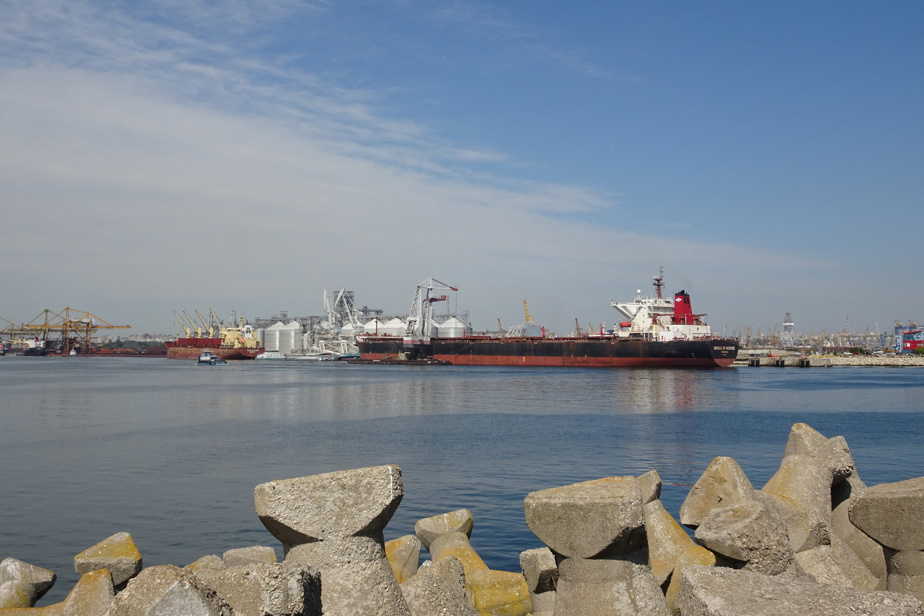(Ankara) Russia has agreed to extend a deal that allowed Ukraine to ship grain across the Black Sea to parts of the world struggling with hunger, Turkish President Recep Tayyip Erdogan announced on Wednesday.
It is seen as a boost to global food security after the more than a year-long war drove up prices.
“I want to give good news,” President Erdogan said. Thanks to the efforts of our country, the support of our Russian friends and the contribution of our Ukrainian friends, the Black Sea Grain Initiative has been extended for another two months. »
Turkey and the United Nations (UN) brokered the landmark deal with the warring parties last summer, which came with a separate deal to facilitate Russian food and fertilizer shipments that, according to Moscow, has not been applied.
Russia had threatened to pull out of the deal if its concerns were not ironed out by Thursday. Such an approach is not new: in a similar extension in March, Russia unilaterally decided to renew the agreement for a period of 60 days instead of the originally planned 120 days.
Russian Foreign Ministry spokeswoman Maria Zakharova confirmed the extension and that the issues should be resolved “on a technical level”. Neither she nor Mr. Erdogan mentioned any concessions Moscow might have received.
“We will continue our efforts to ensure that all conditions of the agreement are met so that it continues in the next period,” said the Turkish president, who announced the much-awaited decision two days after been forced into a second round in the presidential election.
Extension of the “Black Sea Grain Initiative” is a victory for countries in Africa, the Middle East and parts of Asia that depend on wheat, barley and vegetable oil Ukrainians and other affordable food items, especially as the drought takes its toll. The deal has helped lower the prices of food items like wheat over the past year, but that respite hasn’t reached kitchen tables.
Ukrainian Deputy Prime Minister Oleksandr Kubrakov wrote on social media that “the world (will continue) to receive Ukrainian products thanks to the efforts” of Turkey and the UN.
He blamed Russia for dragging its feet on joint ship inspections by Russian, Ukrainian, UN and Turkish officials, and stressed that it welcomes the continuation of the deal, adding that it “has to work.” effectively “.
The average for daily inspections – meant to ensure the boats only carry food and not weapons that could help either side – has steadily fallen from a peak of 10.6 in October to 3.2 last month. Grain shipments from Ukraine have also declined in recent weeks.
Russia has denied slowing down the work. No ships have been allowed into Ukraine’s three open ports since May 6, and Kubrakov says nearly 70 ships are waiting in Turkish waters to participate.
Russia, meanwhile, is rapidly shipping a bumper crop of its wheat through other ports. Critics say this suggests Moscow is trying to wring concessions in other areas – such as on Western sanctions.
The agreement allowed for the shipment of more than 30 million metric tons of Ukrainian grain, more than half of which to developing countries. China, Spain and Turkey are the main beneficiaries, and Russia says this shows that food is not going to poorer states.
UN Secretary-General António Guterres says Ukrainian maize for animal feed has gone to developed countries, while “the majority” of grain for human consumption has gone to emerging economies .
Even though a “significant part” of shipments is destined for developed countries, it “has a positive impact on all countries, as it brings down prices,” Mr. Guterres added to reporters in Nairobi, Kenya, this month. this. “And when you lower prices, everyone benefits. »
Senior research analyst at agricultural data and analytics firm Gro Intelligence, William Osnato, said Russia had made “brags” to push for the easing of some sanctions as it ships record amounts of wheat this season and its fertilizers are also flowing well.
Trade flows tracked by financial data provider Refinitiv show Russia exported just over 4 million tonnes of wheat in April, the highest volume for the month in five years, following record or near record highs in April. course of several previous months.
Exports since last July reached 32.2 million tonnes, 34% more than the same period last season, according to Refinitiv. The data provider estimates that Russia will ship 44 million tonnes of wheat in 2022-2023.
With Ukraine’s wheat harvest coming up in June and the need to sell that crop in July, maintaining a Black Sea shipping corridor is essential to avoid “taking out another big chunk of wheat and other cereals in the market,” said analyst Osnato.
Ukraine can also send its food overland through Europe, but these routes have lower capacity than sea shipments and have sown disunity within the European Union.
It comes as countries like Morocco, Tunisia, Algeria, Syria and others in East Africa – major food importers – face drought and economic problems that could keep food markets going. high food prices.
“Food shortages in the system and lack of affordable fertilizer continue to drive up prices, making it difficult for families in countries like Somalia to predict whether they will be able to afford a meal the next day,” Shashwat explained. Saraf, emergency director for East Africa at the International Rescue Committee.

